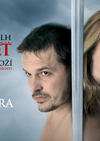The actor Janez Starina (born 1948) is one of the main personalities of Slovenian theatre. He studied this profession at the Academy of Theatre, Radio, Film and Television (AGRFT) in Ljubljana, graduating in 1974. He started his career at the Slovenian Folk Theatre in Celje, where he was engaged for eight seasons, and then spent approximately the next twenty years at the Seaside Theatre in Nova Gorica (called the Slovenian National Theatre today), where he was also the art manager from 1986-1991. From 1994 – 1997 he was its director. In Nova Gorica, he was involved in the birth of a grammar school of art with a focus on theatre where he taught acting and directed school productions. In 2003, he left for the Slovenian capital and became a member of the Ljubljana City Theatre. He has played over one hundred and fifty roles on stage; let’s name for example Dionysus in Cankar’s drama Lepa vida, Edgar in Kroetz’s play Neither Fish, Nor Fowl, the Director in Pirandello’s play Six Characters in Search of an Author, Mackie Messer in Brecht’s The Threepenny Opera, Man in Pasolini’s Orgy, Valerie in Büchner’s piece Leonce und Lena, Mr. Smith in Ionesco’s The Bald Soprano, etc.
He has obtained many prestigious awards for his acting, for example the Borštnik Award (1979), the Bronze Rose (1982, 1985) or the Drama Artists Association of Slovenia Award (1999). He has acted in eleven films and many television productions and series.
His debut as a theatre director came in 1978 when he produced Edward Albee’s The Zoo Story on the stage of Celje theatre. A series of directorial works in Nova Gorica and at other Slovenian theatres, as well as on stages abroad, followed. Becket, or the Honour of God is, after Dušana Kovačevič’s comedy The Marathon Family (1992) and Feydeau’s vaudeville Le Mariage de Barillon (2001), his third production at Brno City Theatre.
Let’s add that he is married and is a father to two children. (His son Matic studies dramaturgy at Ljubljana University and also took part in the production of Becket at Brno City Theatre). He knows Czech literature very well, he likes Jaroslav Hašek, for example, but he is truly in love with – as he himself says – with “the works of Milan Kundera and the poet Jan Skácel from Kotlářská 35a.”








